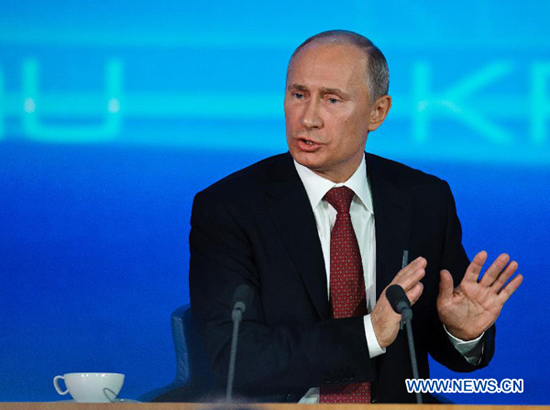M WAQAR..... "A man's ethical behavior should be based effectually on sympathy, education, and social ties; no religious basis is necessary.Man would indeed be in a poor way if he had to be restrained by fear of punishment and hope of reward after death." --Albert Einstein !!! NEWS,ARTICLES,EDITORIALS,MUSIC... Ze chi pe mayeen yum da agha pukhtunistan de.....(Liberal,Progressive,Secular World.)''Secularism is not against religion; it is the message of humanity.'' تل ده وی پثتونستآن
Thursday, December 20, 2012
Putin's diplomatic strategy becomes more pragmatic
Russian President Vladimir Putin on Thursday held his eighth press conference on major domestic issues and foreign relations in 12 years and the first of its kind since his return to the Kremlin this May.
Putin, in front of some 1,200 Russian and foreign journalists, started off by reviewing the results achieved in economic and social spheres in the country.
During his direct conversation with reporters, which lasted four and a half hours, the president outlined his ideas on domestic and international issues.
Russian analysts said Putin's answers indicated that his diplomatic strategy in his third presidency has become more pragmatic as Moscow intends to get closer to the east and mend ties with countries at variances.
CHINA-RUSSIA TIES AT HIGHEST LEVEL
Putin said China-Russia relations are at the highest level in history, when answering Xinhua's question about how he sees bilateral ties between the two countries.
Russia looks forward to developing joint projects with China in areas such as big-hull civilian aircraft manufacturing, Putin said, adding that bilateral cooperation in investment and finance were also very promising.
"This is obvious that Russia-China relations have developed at a fast pace this year. They were at the highest level ever and they keep going in that direction," Yakov Berger, a professor at Russia's Far East Institute, told Xinhua.
Putin also set new goals to bolster China-Russian relations, suggesting that some part of the countries' bilateral trade would be conducted in national currencies.
"Relationship with China is the best example of what two countries could achieve if both of them want it. Still, there are the new challenges in bilateral relations, because traditional structure of their economic exchanges became insufficient," said Alexander Fedorovsky, an expert from the Institute of World Economy and International Relations of Russian Academy of Science.Putin was asked by several reporters about the anti-Magnitsky Act passed by the Russian parliament Wednesday.
In emotional exchanges with the audience, Putin said the controversial bill was not aimed at punishing U.S. foster-parents but the authorities and policy makers.
"What Putin said on that topic is mostly a political game. He knows it pretty well the bill he may sign shortly would not seriously affect the U.S.-Russia ties," Sergei Karaganov, dean of Moscow's High Economic School, told Xinhua.
Putin said he did not use anti-American rhetoric, but still cannot let anyone offend Russia with impunity.
"Reset is not our word, we didn't see the need in it at all, our relations used to be good enough," Putin said.
"We are not enemies, we need to look for compromise though it worsens our relations, but we need to safeguard national interests," Putin stressed.
Putin said the United States made serious mistakes in Libya and Russia was not going to repeat them in Syria. Russia was not concerned with the fate of President Bashar al-Assad's family, but hoped Syrians could stay integrated and launch the political settlement as soon as possible.
SIGNALS FROM ABROAD
Putin said Moscow heard positive signals from Georgia and Japan, the two countries that Russia has had uneasy relations with.
Admitting that Moscow has no ready-tailored proposal on how to normalize relations with Tbilisi and can't retreat from the recognition of Abkhazia and South Ossetia, Putin said Russia-Georgia ties should be resumed.
"Still, since the problem cannot be solved directly, it could be bypassed. In this respect, Moscow could deal with Georgia in the same way it deals with Japan -- restoring normal economic and humanitarian relations in the absence of diplomatic ties, in case of Tbilisi," Karaganov said.
He referred to Putin's words that Moscow has received signals from the new Japanese government about its intention to sign a peace treaty with Russia.
Yelena Yatsenko, president of the Eurasia Heritage Foundation, said relations with Georgia were a difficult issue for Moscow.
"The stalemate between Russia and Georgia could last for a long time, until the new generation of Georgians comes to power. Current generation cannot forgive Russia's recognition of the independence of Abkhazia and South Ossetia," she told Xinhua.
Georgia cut off diplomatic relations with Russia after a brief war between the two countries in August 2008 over control of the Georgian breakaways of Abkhazia and South Ossetia.
Subscribe to:
Post Comments (Atom)


No comments:
Post a Comment